Two members of the same family left Dudley for Lancashire to pursue careers in the top echelon of English football.
Duncan Edwards joined Manchester United as an amateur in 1952, making his debut at 16, the following year. He won 18 England caps and two League titles as a star of the Busby Babes but lost his life as a result of the Munich Air Disaster in February 1958 at the tender age of 20. It is one of football’s great ‘what ifs’ – could he have inspired the England team to World Cup glory before 1966?
Less heralded is Dennis Stevens, three years his second cousin’s senior (another relation of Edwards was Ray Westwood who, like Dennis, enjoyed success at Bolton Wanderers). Dennis merits a higher profile for his ability and enthusiasm which were integral to silverware being won at both Burnden Park and Goodison Park.
Born on 30 November 1933, Dennis was the 12th, and youngest, child of James (a coal miner) and Beatrice. They lived on Bradford Road in the Woodside district of Dudley. Although several of the Stevens brothers displayed footballing ability, only Dennis had the determination to make it his profession. He’d play for Dudley Town FC alongside Duncan Edwards and also represented Worcestershire schoolboys. This is how he came under the spotlight of Bolton Wanderers’ scout in the area. At just 15 he left his family behind and joined the Trotters.
The young hopeful was fortunate to be assigned digs with Arthur and Mary Nash – Arthur was a club scout. They always had Dennis’s best interests at heart – giving his sage advice about avoiding the pitfalls that had undermined other promising players’ careers. In spite of the kindness shown by the Nash family, Dennis – a quiet lad – missed his family and homesickness took its toll to the extent that he pleaded to be taken home. His mother duly came up to Bolton and brought him back to Dudley and he worked for a brief time as a farm-hand.
It is here where Mr Davies, a local sports teacher, stepped in and convinced the teenager not to give up on his dream and pass up the opportunity of a lifetime. His elder brother, Derek, talked him round and practically bundled him onto a train headed north.
Fortunately, on his return to Bolton, Dennis settled down, aided by the arrival of new lodger and fellow youth player, Tommy Neil, and focused on his sporting progression. Both of Dennis’s parents would pass away before the end of the 1950s, so Arthur and Mary became something akin to adopted parents to him. He would never forget their kindness and in their retirement he was always there for them. He’d visit their home every Thursday, taking a box of chocolates, running errands and doing odd-jobs.
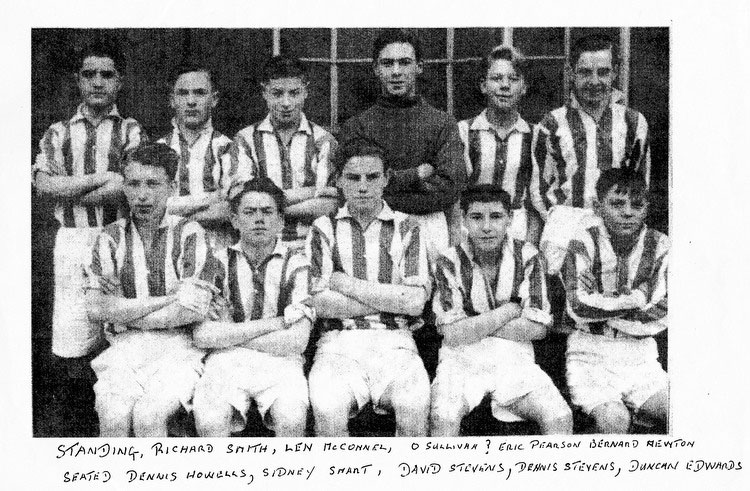
Dudley Town FC, 1948, featuring Dennis Stevens and Duncan Edwards
His Trotters first-team debut came at the age of 19 in a fixture at local rivals Preston North End on 26 September 1953. Playing at inside-left forward he was powerless to prevent a 3-1 defeat. After several months back in the reserves, he established himself early in the New Year wearing the Number 10 shirt, marking his first goal in an away win at Anfield.
He’d be in and out of the side for a couple of seasons before nailing down a place at inside-right early in the 1955-56 season, in succession to Harold Hassall whose career was ended prematurely by injury. Although mild-mannered off the pitch, Dennis was ready for battle on it. Although he was not one to back away from trouble, his stamina and speed would keep him away from some of the cloggers. Tommy Banks, the team’s left-back would later say: ‘They used to queue up to clobber Stevie – but they had to catch him first!’
Dennis met his future wife, Eileen, at Bolton’s Palais de Danse. She recalls:
‘I was there with a group of girls and he was there with his friends. Someone said: “Oh, Dennis Stevens has come in!” But I wasn’t a football person so I said: “Who is Dennis Stevens?” They explained that he played for Bolton. My sister was going out with one of his friends and he’d told her that he’d like to take me out. So he got me up to dance – and that was that – we were married for nearly 60 years!’
After four years of courtship, the couple married in 1960, once Eileen had turned 21. At this point, Dennis moved out of digs and the newlyweds moved into a house in Astley Bridge, Bolton.
So what was life like with Dennis? Eileen still smiles about some of Dennis’s Black Country turns of phrase and remembers his good sense of humour – he was very adept at teasing – especially when it came to his sister. However, she also recalls how Dennis, a non-smoker, took his sporting responsibilities seriously. ‘He loved his football and that came before going out and partying and anything like that. He would never go out on a Friday night. He was dedicated to it. We’d go to the odd gathering and they’d think he was miserable because he was quiet and maybe just had a couple of lagers. All the other ones were swigging it but for him football was his job and there was no way that he was going to jeopardise that.’
As a match approached, he could become taciturn, sat quietly in the armchair ruminating about the game to come. These would be the only times that the couple might argue – often over something trivial – because of the tension that Dennis was feeling. After the match, it was all forgotten by him.
Dennis was twice selected for the England Under-23 side in the spring of 1957. He faced Romania and, four days later, Czechoslovakia – England won both of these matches on foreign soil. Unlike many of his teammates in those matches – which included Duncan Edwards plus Johnny Haynes, Jimmy Armfield, Bryan Douglas and Ronnie Clayton – Dennis never attained full-international honours. If he resented that, being the modest man that he was, he never shared those feelings, even with those closest to him.
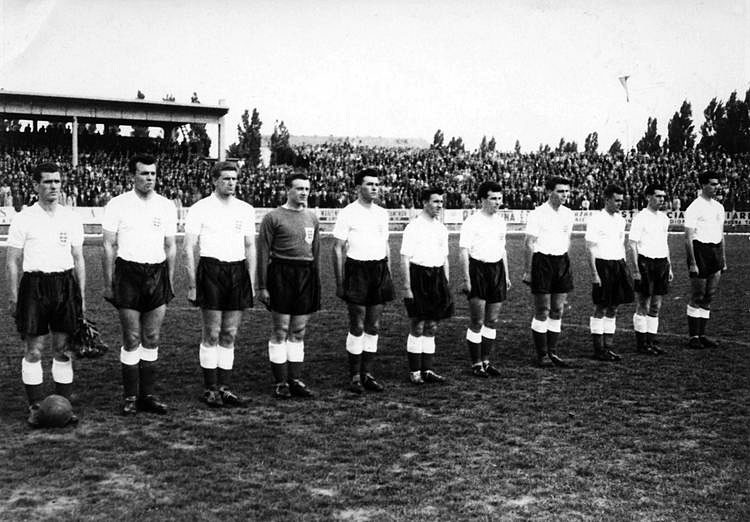
Dennis and Duncan represent England Under-23s in May 1957
A memorable game, in several ways, was the League encounter with champions Manchester United at Burnden Park in September 1957. The Trotters won 4-0 but the match also demonstrated the deep on-pitch rivalry between cousins. Dennis had put the hosts ahead with a superb goal within five minutes of the start but then became embroiled in a running battle with Duncan. After one ‘exchange’, Dennis was carried off the field with, what those on the terraces thought might be a broken leg. He returned to the fray 10 minutes later to rapturous applause after the injury was diagnosed as a ‘bruised nerve’ which had temporarily paralysed his leg.
Duncan did not relent and there were angry exchanges between the pair in the second half when the Manchester United man went in hard again, sending Dennis tumbling. Dennis would confront Duncan after incidents like this but it was merely a case of family rivalry with no quarter being asked or given. Beyond these flare-ups, there was deep affection between the two – so the tragic events of 14 February 1958, and Duncan’s death 15 days later, after a brave battle for life, hit Dennis hard. Later in life, whenever the family visited Dudley and visited the Stevens grave in the cemetery, Dennis would always encourage his sons to go over to Duncan’s grave, which was just a short distance away.
It was a cruel irony that the hastily rebuilt Manchester United side should meet Bolton Wanderers in the FA Cup Final that May. There would be no happy ending for United as the Boltonians went about their business efficiently. They were already a goal to the good when Dennis had a hard shot from the left of the penalty area parried by Harry Gregg. Following up, Nat Lofthouse shoulder-charged the goalkeeper and forced the ball (and Gregg) into the net. Wanderers won 2-0.
Dennis’s closest friend at Wanderers was Ralph Gubbins who lived just around the corner. He was an unsung hero of Bolton. When Bolton got to the 1958 semi-final, Nat Lofthouse was injured so Ralph was called into the team and scored two goals. But he didn’t get picked for the final and never got a Cup winner’s medal.
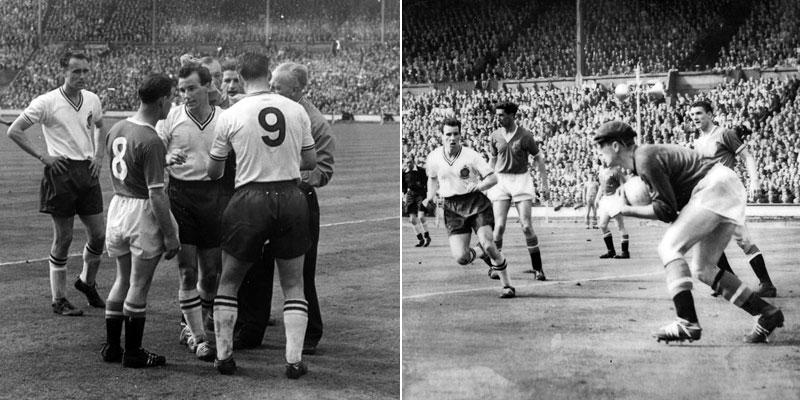
Left: Tempers flare in the 1958 FA Cup final; Right: Dennis watches on as Harry Gregg collects the ball in the same game
Dennis would continue in the Number 8 shirt and his goal output increased over the time – he could be relied upon to get into double figures in support of Nat Lofthouse. When the talismanic ‘Lion of Vienna’ was injured in 1959, Dennis switched to the Number 9 shirt. Although lacking the height and physical presence expected of a centre-forward, he went about his business with vim, hitting the back of the net 15 times in the 1959-60 season. He continued to be asked to switch to centre-forward as and when Lofthouse was unavailable and never let anyone down.
However, during a tough run in early 1962, he was booed off the pitch – something he had never experienced before. It hurt him and made him consider his future at the club he held in such deep affection. It was at this time that word started to first reach him via Arthur Nash that there was interest from Everton. With his goal tally at exactly 100 for Bolton, he made his 311th and final appearance for the Whites at home to Blackpool on 3 March 1962.
Harry Catterick had been in-situ since April 1961 at Goodison Park and had used his time to assess the squad he had inherited from John Carey. Come March 1962, he started to bring in his own players to strengthen and re-shape the team. In came Dennis Stevens, Gordon West and George Heslop. At the time of his arrival from Bolton, Leslie Edwards wrote for the Liverpool Echo about a bit of ‘history’ Dennis had at Everton:
Stevens, latest of Mr Catterick’s buys, is a man who has always struck me as being one of the hardest working and most courageous in the game. In one very hot Everton – Bolton Wanderers reserve match at Goodison Park in which Stevens took part, an Everton player was sent off and the game was held up for some ten minutes while the pitch was cleared of spectators. They included, I am told, an irate lady brandishing an umbrella. All that has been forgotten and forgiven, of course, and Stevens is sure of a welcome when he makes his League debut.
His first outing in royal blue came in a friendly match in Edinburgh against Hibs with the Echo reporting:
Dennis Stevens, Everton’s new inside forward, gave a business-like display on his debut in Saturday’s friendly with Hibernian, at Easter Road, Edinburgh. He seemed physically equipped to withstand the hardest shock tackles of the Scots, and his occasional excursions into goalmouth shooting positions only broke down when the lively ball beamed awkwardly for the stockily-built ex-Bolton forward. Stevens should be able to give more purpose to the Everton attack if it is decided to play him in the support berth.
His Toffees Football League debut came a few days later against Chelsea – the win was convincing but, to the sceptical fans, Dennis’s performance was less so. Frank Keegan, then an Everton-obsessed schoolboy, recalls his first impressions: ‘I looked forward to seeing the new signing. It was a hard-working performance but his shooting was not good with chances missed.’
In mitigation for a low-key debut, Dennis was lining up with unfamiliar teammates and a fellow debutant in young Mick Gannon. The real issue for Evertonians such as Frank Keegan was who was not on the pitch. ‘The consensus in school was that Dennis was okay but he was not Bobby Collins. This was true. Bobby was our leader. He wasn’t much taller than us, but there he was playing for Everton demanding the ball, tackling, scoring goals and what we liked best: he would fight anyone. Dennis got stuck in and worked hard but… he was not Bobby.’
Since his signing in 1958, Bobby Collins had been the team’s talisman and was adored by the supporters for his spirit, skills, goals and inspirational qualities. However, at 31, and having picked up a couple of injuries, Catterick felt that the star was on the wane. A couple of disagreements between the Scot and Catterick and John Moores had also marked his card. Therefore, the manager moved with characteristic stealth and speed to tie up a £32,500 deal for Dennis. Within days of the new arrival, the wheels were in motion for Bobby Collins to move to Leeds United and play a key role in revitalising the club under Don Revie (bizarrely, one obstacle to the transfer was that Collins owned a pig farm near Aintree so he had to get his business matters in order before moving across the Pennines).
It is arguable that Catterick let Collins go too soon and he did voice some regret later when penning his memoir. However, Gavin Buckland, in his study of Everton in the 1960s (Money Can’t Buy Us Love) argues convincingly that Collins no longer had the legs and stamina to perform the role demanded of him – which was to do a lot of the donkeywork to allow his forward-line colleagues, Alex Young and Roy Vernon, to focus on offensive duties. Dennis Stevens, by contrast, had what you’d describe nowadays as a great engine – he could run for 90 minutes and still be ready for more. This, coupled with his and professionalism and unselfishness, made him an ideal player for Catterick.
Derek Temple, who became a life-long friend, reflected on the differences between Dennis and the person he replaced at Everton: ‘He was a little bit unfortunate in that he followed Bobby Collins, who was the best player I have played with. Dennis didn’t have that little touch of finesse that Bobby had but he could hold his own in most company. There were no lost causes and that’s why Harry bought him. We had some players who shone at home but not necessarily away and Harry wanted to stiffen the side up. Bobby used to do that job, he went round kicking anybody. Dennis wasn’t shy in putting his foot in – he could look after himself. But the crowd didn’t really take to him or see what he was giving.’
Frank Keegan agrees with Derek’s observations: ‘What we didn’t see at the time was what Harry Catterick had seen and what he had planned. Catterick had inherited a good team at home but a poor one away. Having made his signings, Catterick set about using the remaining games to try a variety of tactical changes and Dennis was key to these.’
Whilst supporters may have had reservations about the new arrival, Derek Temple says that there were no such doubts for the Everton squad and management team. ‘Dennis was a footballer’s footballer – with tremendous will-power and will to win. He had the backing of the players – we had played against him and admired him as a player – and we accepted him. He was a manager’s dream – especially for someone like Harry. Soon after Everton had bought him, there was a five-a-side game at Bellefield. The ball went up the other end – it was an open goal with the other side’s player about to tap it in – when out of nowhere Dennis appeared and took it off his foot. Harry was there on the touchline rubbing his hands together, he was made up!’
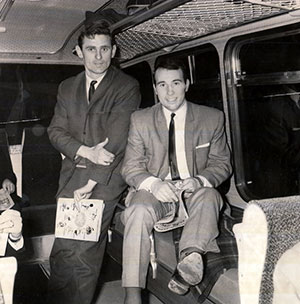
Mick Meagan and Dennis Stevens on the coach
Mick Meagan, who, like Derek, became a pal of Dennis’s, concurs: ‘It’s amazing how birds of a feather flew together. Dennis was no sooner in the place than the lads decided: “He’s one of us.” He did not get the credit he deserved but the players loved him.’ Naturally, that respect did not let Dennis off a ribbing, as Mick recalls: ‘We always took the mickey out of him, as in the 1958 FA Cup final, after the Lofthouse goal, Dennis ran towards Nat to get his arms around him but Nat ran right past him without stopping. So all the lads would say: “We thought you were a big name, but Lofthouse didn’t bother with you!”’
The dissent from the terraces in those early weeks at Goodison was hard to ignore and caused Dennis some self-doubt as to whether he was of the required standard for Everton. It was here, Eileen recalls, that the manager played an important role: ‘Harry Catterick got him into the office, as he must have understood that Dennis was feeling a bit inferior to these big name players. And Harry said, “You are just as good as they are.” He gave him back his confidence and overcame this feeling of not being as good as the others. He soon felt a part of the team and loved it there.’
Dennis recalled this period 30 years later: ‘Harry Catterick was a hard manager but also very fair. If you worked hard for him and caused no problems, he was very good to you. He certainly helped me settle in and always stressed that I should believe in myself.’
Slowly but surely, Dennis won the crowd around. In his sixth match, away to Blackburn, he scored his first goal and also demonstrated versatility by dropping back to wing-half when Brian Harris went in goal to replace the injured Gordon West. Frank Keegan recalls: ‘He scored again in the next game against West Ham and was now winning the crowd over. Another goal followed away at Man Utd making it three goals in four games. The season ended in spectacular fashion in a game I remember well, not least for the 8-3 scoreline. Dennis scored one of the goals but in reality he could and should have scored four. His value to the team was now there for all to see. Prior to his arrival, Everton had lost eight of their 14 away games and another in the cup. Following his arrival, we lost just one at Spurs.’ Derek Temple adds: ‘He was accepted by the fans in time as they recognised that he never gave anything less than 100%.’
The Stevens family was provided with a semi-detached club house, at 1 Nantwich Close in Arrowe Park, Birkenhead. Sons Gary and Julian became used to star players calling round – perhaps not appreciating at the time just how privileged they were. Not being one of the ‘Goodison Rat Pack’ who frequented the Royal Tiger, Dennis would socialise with Brian Labone, Brian Harris, Derek Temple and Mick Meagan. The latter, nick-named Dermot by Dennis after an Irish tramp character in the Arthur Haynes TV series, recalls fondly: ‘I enjoyed his company and he was a wonderful person. We’d sneak out after matches for a good little time with Brain Labone and Brian Harris. Dennis wouldn’t let you do anything bold – he’d keep you in line! He’d just have one or two little drinks and a laugh – taking the mickey. And he loved a game of golf with me, Derek and Brian making up the fourball.’
Dennis’s physical prowess, coupled with the high-esteem in which he was held by Harry Catterick, meant that he was an ever-present from joining the club in March 1962 through to September 1964 – a remarkable 112 consecutive appearances (the 5th longest run for an Everton outfield player to date). His desire and capacity to get around the pitch and cover for others might not have always been seen by some supporters but was appreciated by the likes of Mick Meagan: ‘He was a great player. He was up and down, up and down, and he enjoyed that was the great thing about him. I was very slow and he’d say: “Now listen, Dermot… I’ll be there to help you out.” And, sure enough, he was.’
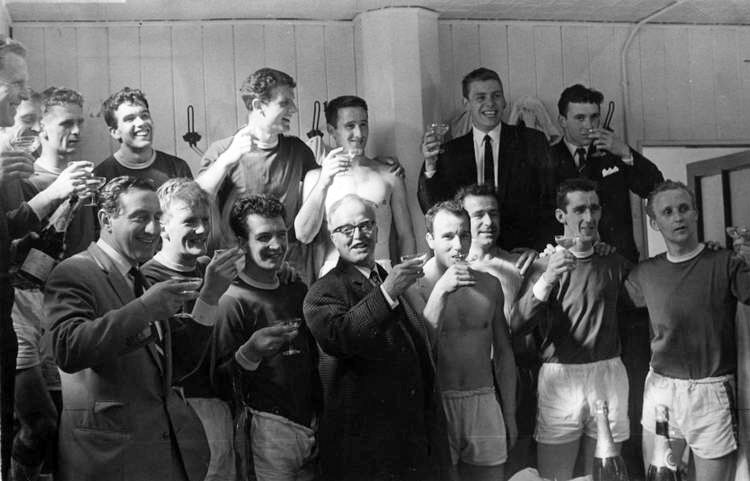
Celebrating the League title win in the changing rooms in 1963
With the steel provided by Dennis, Jimmy Gabriel and Tony Kay (replacing Brian Harris mid-season), Everton were able to win their first post-war league title in 1963. The side was crowned the champions of England on the final day of the season – a 4-1 defeat of Fulham. Eileen was not there to see it, however: ‘John Moores had promised the lads that if they won that day he’d take us all to Torremolinos as a treat. So foolishly I headed into town to buy some clothes. So it’s one of the biggest times in Dennis’s sporting life, and he’d be doing a lap of honour after winning – and there I am going to the shops that were empty as everyone was at the match! I can’t believe that I did it – but I was young and foolish!’
Perhaps Dennis’s finest 90 minutes for Everton came in the 4-0 demolition of Manchester United in December 1963 (sweet revenge for a 5-1 defeat in August). Dennis scored one of the goals – and could have had more – but his all-action display was near-faultless. Leslie Edwards’s match summary purred with praise for the Dudley man:
It was inspired, inspiring stuff… And through the general pattern ran the gold strand of Stevens’s accomplishment in every facet of the forward game. An astonishing display of the forward arts by Dennis Stevens was instrumental in one of their most notable victories for years at Goodison Park. They not only beat Manchester United, they almost literally pulverised them. Stevens… put on the game of his life. He started with two big shots and continued with a performance which took him to all parts of the field. He capped it all with a remarkable solo run which brought the house down and left me in no doubt that here is a player who not only has the answer to a massed defence but the answer, too, to the off-side trap. In short, when the place is cluttered with defenders and it is hard to find anyone with a pass, the only counter is a do-it-yourself gambit. Stevens did just this… Foulkes and company were completely out-maneuvered.
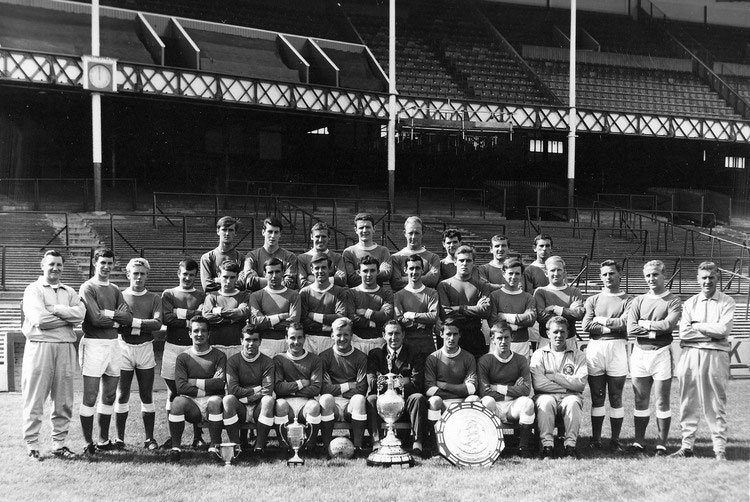
Everton’s 1963-64 squad
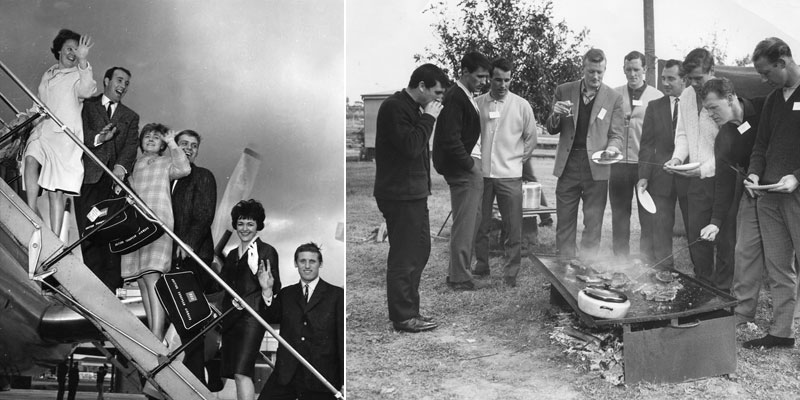
Left: Getting on a plane bound for Torremolinos in May 1963; Right: Enjoying a BBQ on the Australian tour of 1964
By the 1964-65 season, Dennis was starting to feel the challenge of Colin Harvey for his inside-forward berth and switched to the half-back line (Harvey was a different type of footballer but shared Dennis’s dedication and will to win). His season ended with a cartilage operation in March. The following season, he was a bit-part player as the team evolved. His final two appearances came at inside-left in November 1965. Over the festive period, Everton accepted a £20,000 bid for the 32-year-old from Oldham Athletic of Third Division. Eileen and Dennis reluctantly packed their bags and moved east. Eileen recalls: ‘He loved it at Everton and they were great people. We didn’t really want to move back but he was transferred to Oldham, so that’s what we did.’ Their vacated house on Nantwich Close was soon occupied by Brian Labone and his partner, Pat.
Dennis had been a model of consistency for the Blues, scoring 23 times in 143 appearances. He’d fulfilled the slightly unsung hero role in a Championship-winning team previously performed by Stan Bentham in 1938-39. Frank Keegan gives his fan’s eye view: ‘Dennis never became Bobby Collins. He was Dennis – and a favourite. A great player in a great team, who developed a great understanding with those around him and adapted seamlessly in other positions when called upon. He was a remarkably consistent player.’
Dennis brought his customary experience and professionalism to the Latics. In January 1966, they took West Ham to an FA Cup replay at Upton Park. The Daily Mirror noted: ‘The experience of former First Division players like Dennis Stevens and lan Towers has given Oldham football authority. It was a match for most of what West Ham could produce on this morass of a pitch.’ The visitors finally succumbed to a late Hammers winner from Peter Brabrook. After 38 appearances for the Boundary Park outfit, he was back on the move again – ironically to a club in close proximity to his previous home.
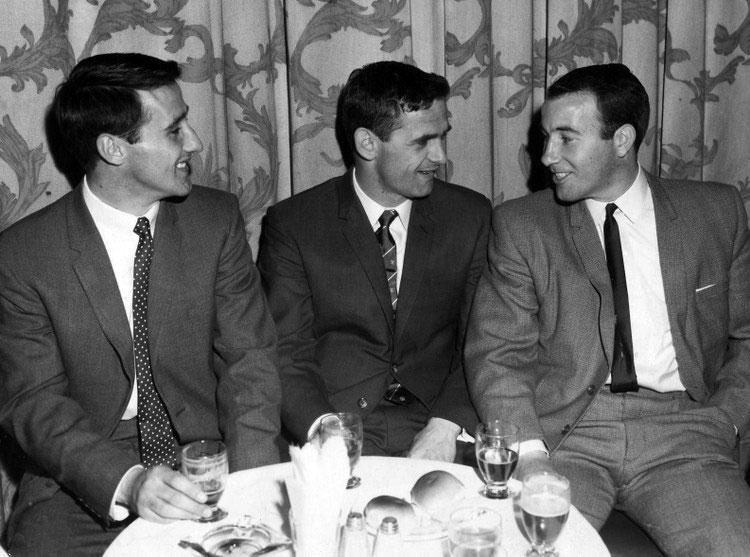
Dennis looking dapper with his good friends Derek Temple and Mick Meagan
A free transfer took him to play for Tranmere Rovers in March 1967 (he’d commute from Bolton rather than relocate the family again). His nous at right-half helped to get to them into the Third Division promotion places at the end of the season. He was also a regular in the 1967-68 season in his more traditional inside-right berth. The football gods decreed that his final game should be at Goodison Park – an FA Cup 5th Round defeat to Everton in March 1968. Although the ‘engine’ probably had a few seasons left in it, a disc injury brought his playing days to a close.
Dennis then embarked on a completely new career as a gents’ outfitter. Although he was not a flash person, he’d had a life-long interest in clothing and looking smart (he kept 22 suits when he was a player). Derek Temple was always impressed: ‘His dress sense was always immaculate – extremely smart with good co-ordination.’ The shop, in the Harwood area, focused on high-quality Odermark suits imported from Germany – people would come from distance to purchase them. Alan Ball, one of Bolton’s greatest sons, came to open the shop (Dennis would make an effort to take his sons to watch Ball play in the 1970s).
The business was originally a partnership but when Dennis and the other businessman decided to go their separate ways, they left it to the toss of a coin to see who would keep the shop. Fortunately for Dennis, he called it right. For a brief period there was some competition when Frank Worthington opened a clothing emporium nearby – however, the fashions Frank offered were more, shall we say, flamboyant? The business was successful, allowing Dennis to retire at 58 to enjoy more family time (with some golf and football watching thrown in, of course).
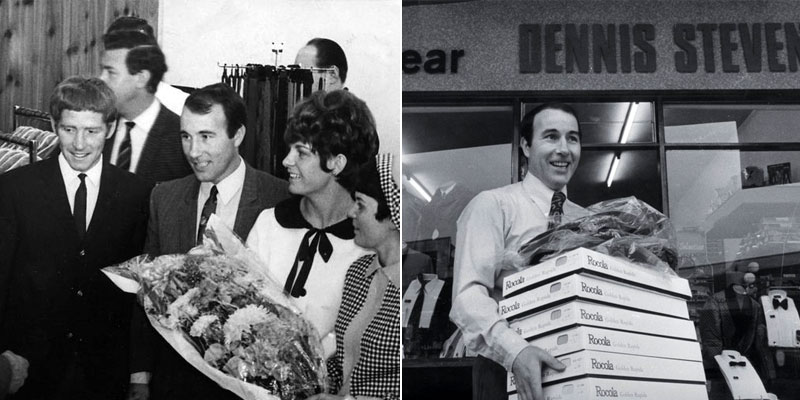
Left: Alan Ball opens Dennis’s new menswear store; Right: Dennis outside his shop
Dennis would get over to midweek matches at Burnden Park and Gigg Lane or, occasionally, Goodison Park – a place he loved to revisit and have a chance to rekindle old friendships. In 2002, on the opening day of the season, there was an amusing incident there, as Gary recalls: ‘A client of mine, a mad Evertonian, invited me to the first home game of the season. I never even spoke to my dad to say that I was going, I just went. We were there in the eating area and Brian Labone came past so I introduced myself as Dennis’s son. And he said, “Oh yes, I’ve just been with your dad.” And said, “What do you mean?” to which Brian said, “He’s here at the ground.” It turns out that it was the celebration of 100 years in the top flight so the older players all got shirts to celebrate and went round the pitch. So when I went down and saw him he couldn’t believe it: “What are you doing here?!”’
Dennis always kept in touch with Mick Meagan and Derek Temple – with Eileen, he’d go to stay with them in Ireland. When they arrived at Dublin Airport to visit the Meagans, true to comic form, Mick saw to it that his partner held aloft a large sign in the arrivals hall with NAT LOFTHOUSE written on it.
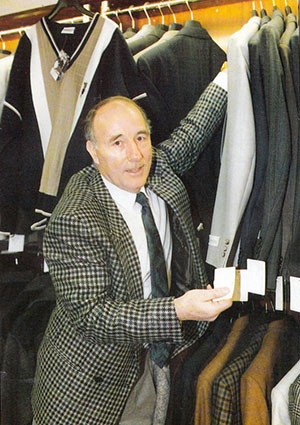
Dennis in his shop in 1991
Although a post-playing career in professional football had not appealed to Dennis, he did coach a local team, Silcoms, for many years. He also tried to watch or be involved with his son’s teams, although it was always difficult until he retired. Gary and Julian would follow in his footsteps; they both played local football and ran kids and adult teams in the locality. Monday was golf day for Dennis – when he was still running his business, Eileen would come down to mind the shop in order to free him up to enjoy a four-ball. The stamina that made him a great player was still there – he’d play 36 holes punctuated by lunch.
Several years after retiring, Dennis noticed the first symptoms of Parkinson’s disease but, with medication, he was able to lead a normal life and still play golf – only late in life did the symptoms become more severe. The toll on his body of 20 years as a professional footballer necessitated two back operations plus hip and knee surgery (with the PFA and Everton Former Players’ Foundation both assisting financially). Eileen recalls: ‘I asked him, once, if he would have his time in football all over again – in spite of all the troubles with knees and his back. And he said, “Oh yes, absolutely. I’d do it all again.”’ In retirement, they’d watch football on TV together and Eileen would come to appreciate the sport better: ‘I got to learn more about football from watching it, especially when Dennis was retired from playing and we used to sit and watch the matches on TV on Saturday night. He’d explain things clearly to me and we’d listen to the analysis – and you get to appreciate it more. It is a great game, really.’
Dennis passed away on 20 December 2012 at the age of 79. He had also been affected by Alzheimer’s in his final two years. A well-attended funeral service was held at St Maxentius Church. Phil Brown, John Byrom, Tommy Banks, Roy Hartle, Billy Bingham, Jimmy Harris, Tony Kay and Mark Higgins were among the ex-players paying their respects. Heartfelt eulogies were delivered by his friends Derek Temple and Dr Kieran Moriarty (for whom Dennis had done much fundraising work). Dr Moriarty said: “The qualities a player shows on the sports field are virtually always the same qualities that he displays in life. Reading the tributes to Dennis shows just how true this is. The words shone through — modest, selfless, honesty, unobtrusive, gem, perpetual motion, didn’t believe in lost causes and unsung hero.’
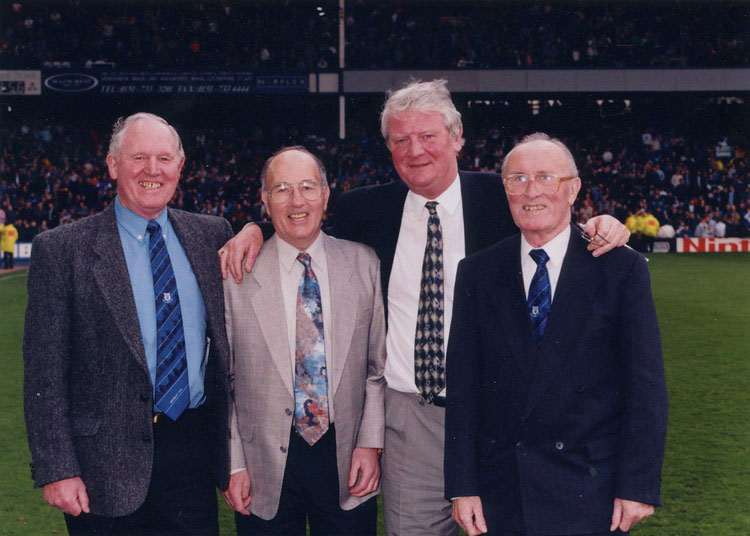
L-R: Harry Leyland, Dennis Stevens, Brian Labone, and Tommy Eglington at Goodison in the mid-1990s
My thanks to:
The Stevens family
Frank Keegan
Mick Meagan
Derek Temple
Photos are taken from the Stevens family collection except the colour image of Dennis in his shop (taken from the Everton matchday programme) and the image of him with Mick Meagan which is from Roy Vernon’s family collection.
Sources:
The Bolton News
The Liverpool Echo
Daily Post
The Independent (obituary by Ivan Ponting)
Everton matchday programme
Money Can’t Buy Us Love: Everton in the 1960s (Gavin Buckland)
The Everton Encyclopedia (James Corbett)
bluecorrespondent.co.uk (Billy Smith)
evertonresults.com (Steve Johnson)
evertoncollection.org.uk

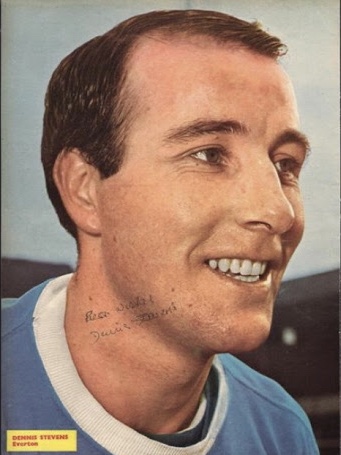
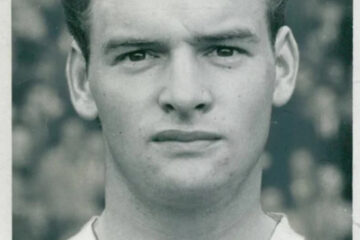
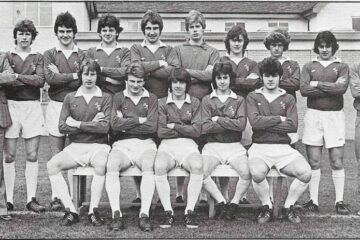
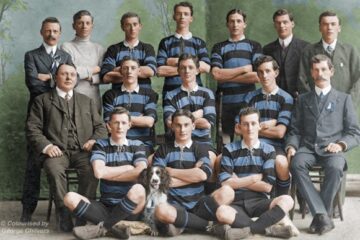
What a great piece Rob.Interviewed Dennis 40 years ago and he was not happy with Duncan in Jan 58! He was, however, happy they had sorted matters out before what happened 2 weeks later.
Well done,
Roy
He was my mother’s younger brother my uncle and I would visit him in his has I was a H.G.V driver and would stay over night at thier home